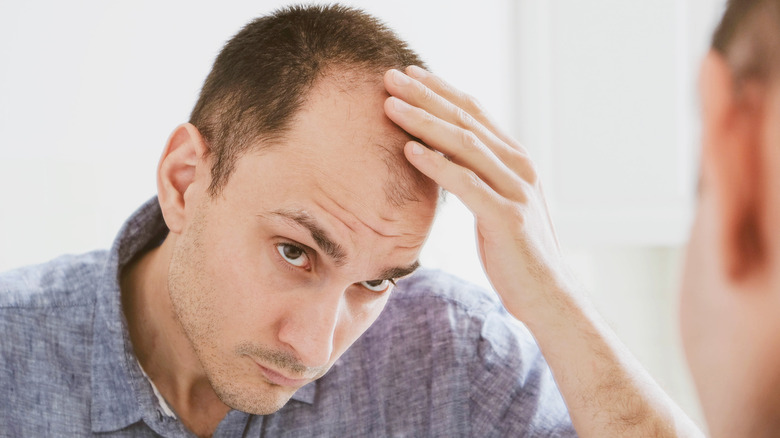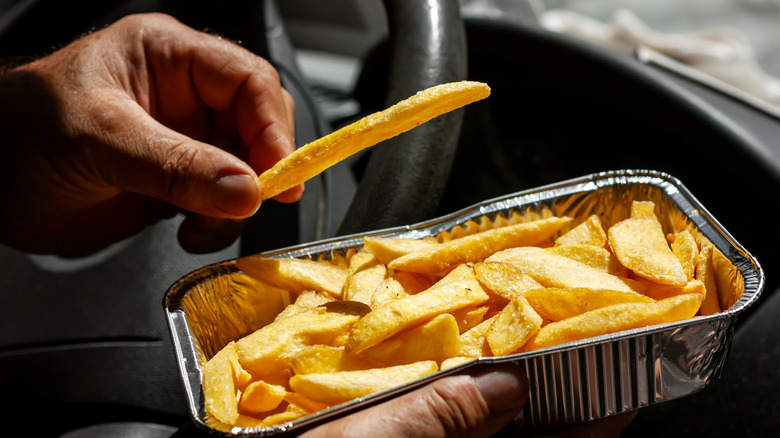Diet And Male Pattern Baldness: Is There A Link?
It can be very disconcerting for men to look into the mirror and notice a little less hair atop their heads every day. The numbers around male pattern baldness show that half of the world's men will start to lose, or will have lost, hair by the time they reach 50 years old. For 25% of men, their hair will begin to fall out before they reach 21 (per Cleveland Clinic).
Male pattern baldness occurs when the hair follicles atop the head become weaker over time, causing the follicle to shrink. Over time, the hair stops growing and there is no new hair to replace it. In general, Healthline notes that genetics are to blame for the majority of cases of male pattern baldness, although certain health conditions can also be a factor in baldness, such as thyroid problems, anabolic steroid use, and fungal conditions. However, what you are putting into your body at mealtimes could also be impacting your hairline.
Having a poor diet can ravage your hairline
According to a 2020 study published in Skin Appendage Disorders, anti-inflammatory diets, such as the vegetable-rich Mediterranean Diet, may be beneficial in promoting healthy hair and keeping hair loss at bay. This research was further bolstered by a 2018 study published in the Archives of Dermatological Research. The study found that consuming raw vegetables and herbs three times weekly helped to reduce the risk of both male and female pattern baldness.
However, as much as a healthy diet may save your hair, a 2021 study published in Nature showed that unhealthy eating could potentially wreak havoc on your scalp. In the study, researchers at Tokyo Medical and Dental University showed how obesity and a high-fat diet led to a depletion of hair follicle stem cells, leading to hair thinning and preventing new hair from growing.
A crash diet will not do you any favors, either, Healthline notes. If you restrict your calorie intake too much, your hair won't get the essential nutrients that it needs, and your hair will suffer as a result. A 2017 study published in Dermatology Practical & Conceptual showed that crash diets can deprive a person of iron, zinc, and fatty acids. Deficiencies in these nutrients can lead to a type of hair loss known as "acute telogen effluvium."
What to do about hair loss
In general, proper nutrition is a powerful tool in the battle against hair loss, according to a 2017 study published in the International Journal of Trichology. The study showed that people with thinning hair had a number of nutritional deficiencies, including lower levels of iron, zinc, and copper. In addition, the majority of the patients showed a deficiency in histidine, an amino acid that is found in such foods as meat, fish, poultry, and nuts.
In addition to a good diet, there are a number of other things a person dealing with hair loss can do to address the problem. These range from changing your hairstyle or trying an over-the-counter treatment such as Rogaine. You can also talk to your doctor about a prescription medication such as Finasteride, although there are side effects to consider. Keep in mind, too, if you stop taking medications like Rogaine and Finasteride, your hair loss will resume.
No matter what you choose, it's better to address hair loss as soon as you begin to notice it to ensure that you can keep the hair you have and not lose any more.



